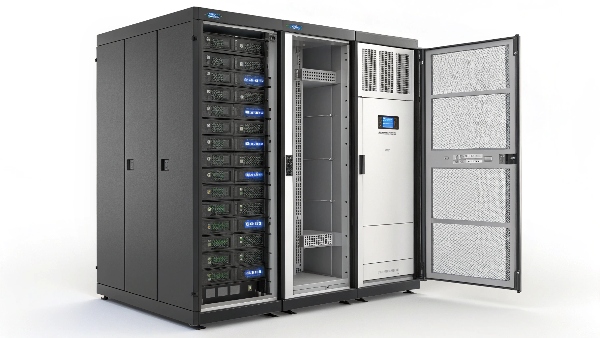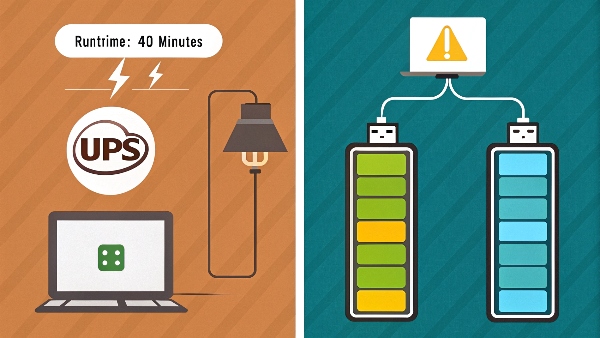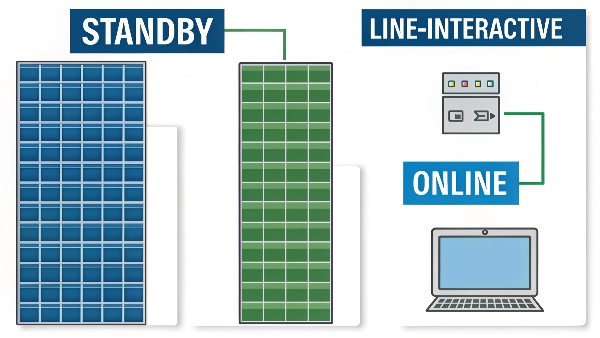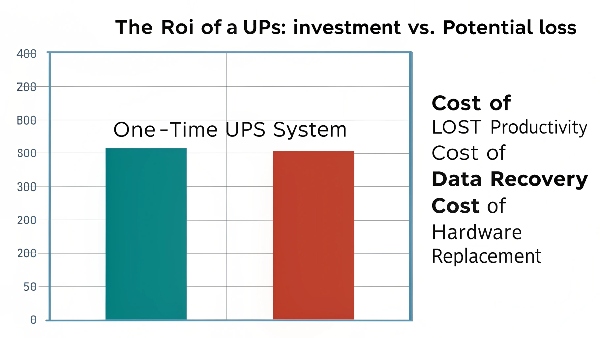Your business relies on consistent power, but you're unsure how to protect it. A simple UPS box seems inadequate, leaving you exposed to costly downtime during an outage.
A UPS energy storage system is a complete solution that provides instant, clean backup power. It combines the UPS unit with batteries, wiring, and often cabinets to ensure your critical operations continue without interruption, protecting against data loss and hardware damage.

Transition Paragraph:
At Daopulse, we don't just sell boxes. We design complete power solutions. I've learned from countless projects that many people misunderstand what a "system" is. A key insight I share with our OEM/ODM partners is that a UPS energy storage system includes the UPS unit, the batteries, the wiring, and the matching cabinets. Thinking of it as a complete, integrated system is the first step to understanding its true value and ensuring you get the protection you actually need.
How long will a 500 watt UPS last?
You see "500 watts" on the box but have no idea how long it will actually run your computer. This uncertainty makes it hard to know if you're buying enough protection.
A 500W UPS's runtime depends entirely on the power draw of your devices (the load). A light 100W load might last 40 minutes, while a heavy 400W load may only last 5 minutes.

Dive deeper Paragraph:
This is one of the most common questions we get from clients. It's important to understand that "500 watts" describes the maximum output power the UPS can deliver at one time, not its energy storage capacity. The actual runtime is determined by the battery inside. Think of it like a car engine and a gas tank. The watts are the engine's horsepower, but the battery's Amp-hour (Ah) rating is the size of the gas tank. A small load sips power from the tank slowly, while a heavy load drains it quickly. As an ODM manufacturer, we help clients like system integrators calculate their total load first. Then, we design the system with the right battery capacity—either with cost-effective lead-acid batteries or high-density lithium batteries—to meet their specific runtime requirements.
Example Runtime for a 500W UPS
| Connected Load | Estimated Runtime | Use Case |
|---|---|---|
| 50 Watts | ~1 hour 15 mins | Modem, Router, Small PC |
| 150 Watts | ~25 minutes | Desktop PC & Monitor |
| 300 Watts | ~8 minutes | Gaming PC or Server |
| 450 Watts | ~3-4 minutes | Heavily loaded server |
These are just estimates. The key is to match the battery capacity to your load and required runtime.
What are the three types of UPS systems?
You hear terms like Standby, Line-interactive, and Online. The technical jargon is confusing, and you're worried about choosing the wrong type of protection for your valuable equipment.
The three main types of UPS systems are Standby (Offline) for basic home/office use, Line-interactive for business servers with voltage regulation, and Online (Double-conversion) for perfect, non-stop power for critical systems.

Dive deeper Paragraph:
Choosing the right UPS topology is fundamental to designing a reliable energy storage system. Each type stores and delivers energy differently. The Standby UPS1, also called Offline, is the simplest. It passes utility power directly to your devices and only switches to its internal battery when power fails. It's a great, affordable choice for basic computers. The Line-interactive UPS is a significant step up. It also passes utility power through, but it has an internal transformer that actively corrects minor voltage fluctuations without using the battery. This is the workhorse for most business environments, protecting servers and network gear from common power sags and surges. The final type is the Online (or Double-conversion) UPS2. This is the ultimate in power protection. It constantly converts incoming AC power to DC to charge the battery, and then back to perfect AC power for your equipment. Your devices are completely isolated from the grid, receiving a flawless power signal at all times. This is the only choice for mission-critical applications like data centers, hospitals, and financial institutions.
What is the difference between a UPS and general energy storage?
You hear "energy storage" for solar panels and "UPS" for computers. You wonder if they are basically the same thing or if there's a critical difference you're missing.
A UPS is a highly specialized energy storage system. It's designed for instant, high-quality power delivery to prevent interruptions. General energy storage (like for solar) focuses on storing large amounts of energy for long-term use.

Dive deeper Paragraph:
While a UPS is a form of energy storage, its purpose is very specific. The key difference is the "U" for uninterruptible. A UPS is built for speed and quality. Its inverter can switch from grid to battery power in a few milliseconds, so fast that your electronic equipment never notices the change. It's also designed to produce a pure sine wave output, which is the clean power that sensitive electronics need. On the other hand, a typical Battery Energy Storage System (BESS) used with solar panels is designed for capacity and duration. Its goal is to store many kilowatt-hours of energy to power a home through the night. Its switchover time might be slower, and its power quality might not be as pristine, which is fine for lights and appliances but not for a sensitive server. At Daopulse, our expertise lies in the high-reliability UPS world. Whether using our lead-acid or patented lithium solutions, our focus is always on providing that instant, clean, and reliable power that defines a true uninterruptible system.
Is a complete UPS system worth it?
You see the costs for the UPS, the batteries, and the installation. You have to ask if this entire system is a necessary investment or an expensive luxury for your business.
Yes, a UPS system is worth it. The cost of a single power event—lost business, data recovery, and hardware replacement—is almost always much higher than the proactive investment in a reliable UPS system.

Dive deeper Paragraph:
As someone who builds these systems, I can tell you it's one of the best investments a business can make in its own stability. You have to think about the total cost of not having one. What is the cost of one hour of downtime for your entire office? What is the cost if a power surge destroys your main server? These potential costs make the price of a robust UPS system look very small. This is especially true when you work with an experienced OEM/ODM manufacturer like us. We can help you design a system that fits your exact needs and budget. For a Procurement Manager at a large company, a certified system (CE, RoHS, ISO) is not just about power; it's about reducing risk and ensuring compliance. For a System Integrator, a reliable, well-built UPS system means a happy client and no emergency service calls. It provides peace of mind. A UPS system is not a luxury; it's a fundamental piece of modern business infrastructure.
Conclusion
A UPS energy storage system is a complete solution for power reliability. It is worth the investment to protect against costly downtime, data loss, and hardware damage from any power problem.

